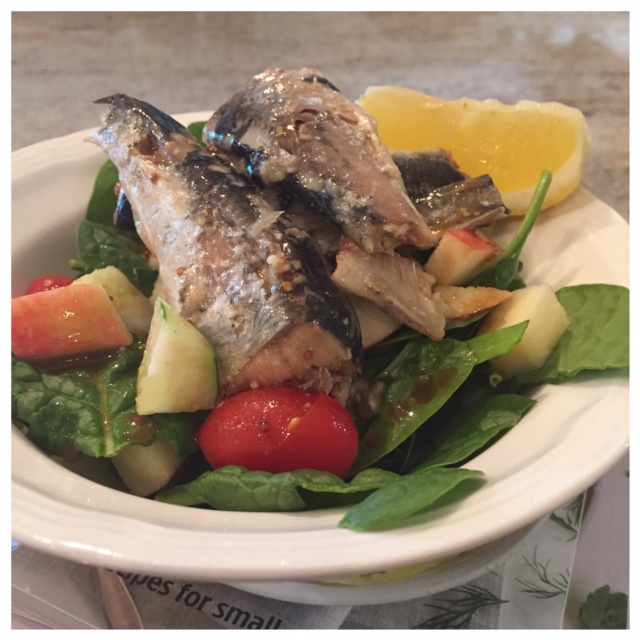eat more fish
 Yes, those are sardines!
Yes, those are sardines!
My dad used to eat sardines. I remember turning up my nose as a child. I have given them a try a couple of times as an adult, mostly so that my kids would experience them for themselves as I did.
I remember having a fish tasting one year during a homeschool study on oceanography. I guess they had the same reaction as I did in my youth because, to my knowledge, none of my adult children eat them now!
Recently my neighbor suggested that she loved sardines on a salad. I must have been really hungry at the grocery store, because I decided to try them once more. And guess what? They were all bad. As a matter of fact, I liked them.
I think the fact that they were packed in water made a difference. I purchased Brunswick Sardines with no salt added, so I could control the amount.
So with a little squeeze of lemon, some homemade whole grain mustard vinaigrette, a little cucumber, tomato, and apple, I layered them a-top a spinach salad. To my surprise, I rather enjoyed it. I will definitely put them on the grocery list and my lunch menu again.
Sardines are an oily fish, like salmon, which CAN make them a bit fishy tasting, but the oil is what makes them healthier to eat. (My Brunswick Sardines weren't all that fishy.)
Eating any kind of fish is really good for you. They are loaded with important nutrients such as omega 3 fatty acids which are important for your body and your brain, fish also contain lots of protein, calcium, iron, magnesium, phosphorous, potassium, sodium, and zinc. Vitamins include thiamin, riboflavin, niacin, vitamin B6, folate, vitamin B12, A, D, E and vitamin K.
Sardines are also a very good source of phosphorus, a mineral that is important to strengthening your bones. Eating fish at least once a week will help guard against heart attack and stroke.
Sardines are rich in protein, which provides us with amino acids. They are also loaded with protein and amino acids. Amino acids are important because our body uses them to create new proteins, which serve as the basis for most of the body's cells and structures—forming the basis of muscles, connective tissues, and antibodies that keep our immune system strong. In turn proteins assist in delivering oxygen and nutrients throughout the body.
